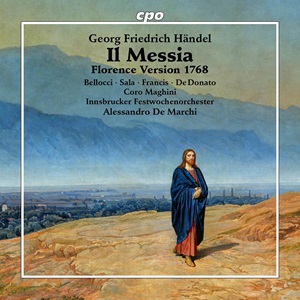
Georg Friedrich Händel (1685-1759)
Il Messia – Oratorio (in due parti) (Florence version 1768)
Eleonora Bellocci (soprano); Margherita Maria Sala (contralto)
Jeffrey Francis (tenor); Luigi De Donato (bass)
Coro Maghini
Innsbrucker Festwochenorchester/Alessandro De Marchi
rec. live 12-14 August 2022, Haus der Musik, Innsbruck, Austria
Italian libretto with English translation
cpo 555 590-2 [77]
I was curious to hear this new recording of Messiah, as the prospect of hearing Handel’s most famous oratorio in Italian was intriguing. Handel had in his early twenties spent several years in Italy, where he had early success with works such as the Latin psalm setting Dixit Dominus and the opera Agrippina. He continued to write to Italian libretti throughout his life. He did not, however, have anything to do with this version of Messiah which was first performed in Florence in 1768, nearly a decade after his death under the auspices of the English Florentine resident and great patron of the arts, Lord Cowper. He commissioned a version abridged by about a third, reduced from three to two parts. It was set to newly composed Italian verse only loosely based on the English biblical text but retaining the spirit and even the rhythms of the original. As far as we know, that was the first performance of Messiah outside the British Isles and it is here recreated with slightly larger choral and orchestral forces. It was known to scholarship that such an event had taken place, but it was not possible to reproduce it until the score was acquired from a private owner by the Handel House Foundation of Halle in 2019.
It is a very “period”, small-scale performance compared with classic versions by such as Colin Davis, let alone the Victorian blockbuster approach of yesteryear, but lines are clear, intonation is precise and tempi are nicely sprung. Conductor Alessandro de Marchi always maintains momentum but does not rush the music; tempi are invariably well-judged. To give you a sense of scale, the choir is twenty-three strong, the orchestra twenty-nine. The live recording acoustic is quite reverberant, conveying a sense of space; there is barely a cough to be heard.
The overture begins with an atmospherically brooding passage in which a keening lead violin describes curlicues over a bass ground. Then the opening vocal number is “Comfort ye” – or rather “Confortati” – and given to the soprano rather than the tenor – who is in fact left with very little to do. One immediately notices that the rhythms and stresses of the Italian text have been devised to fit the music neatly. Unfortunately, I am not in the least enamoured of her hard, shrill timbre which has, as the cliché goes, “more needle than thread”; she is agile enough but twitters her way through the coloratura and is given the lion’s share of the solos throughout. “E la gloria allor del ciel” introduces the small choir who are adept but very distant in the aural landscape; again, the text here works very well – less so for the bass’ Accompognato, as the opening apostrophe “For behold” is missing and the stresses sounds wrong. I like Luigi De Donato’s sonorous, gravelly bass, cast in the Cesare Siepi school of sound, and his two big and demanding arias are skilfully despatched. The Italian equivalent of “For unto us a child is born” is jauntily delivered first by the vocal quartet then with choral backing for outbursts of “ottimo, provido” (wonderful, counselor), and is most enjoyable. The pastoral interlude is likewise charmingly played, the vibrato-free bowing enhancing its rustic flavour. (The libretto and CD tracks go out of synch here from track 8 onwards, as the booklet omits to allocate a number to the Pifa.) The Alleluia/Halleluja Chorus comes off surprisingly well, the choir delivering it con gusto, the six sopranos in particular displaying both admirable purity of tone and considerable heft; the same may be said of “Nubi, rompete” (Lift up your heads). “Tormento atroce” (He was despisèd) is sung is stately, dignified fashion with a little tasteful ornamentation by warm contralto Margherita Maria Sala. The concluding chorus “Degna è la vittima” (Worthy is the Lamb) makes a fine peroration to a similarly worthy, if slightly odd, confection.
At only seventy-seven minutes, it is in one sense little more than highlights, but if you can put aside any preconceptions and familiarity with the original it hangs together successfully. On whether it is anything more than a curiosity I feel unable to pronounce – although I doubt whether I shall hasten to return to it, despite having enjoyed making its acquaintance.
Ralph Moore
Buying this recording via a link below generates revenue for MWI and helps us keep free access to the site




















